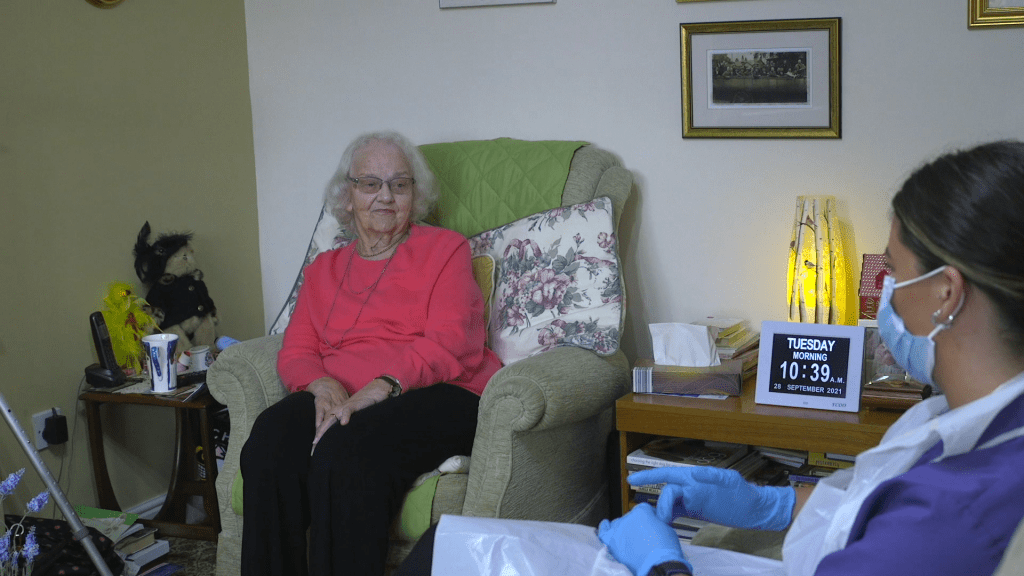How Can I Tell if My Loved One Needs Home Care? Understanding the signs can help with deciding about Homecare For A Loved One.
As our loved ones age, it can be difficult to know when the right time is to seek additional support. Deciding whether they need home care is a sensitive and emotional process. Recognising the signs can ensure they receive the right care at the right time. Home care can provide vital support, helping individuals maintain independence while ensuring their safety and well-being. Here are some key signs that may indicate it’s time to setup homecare for a loved one.
1. Difficulty with Daily Activities
A common indicator that it maybe time to set up homecare for a loved one is difficulty managing everyday tasks. This includes:
- Personal hygiene: Struggling to bathe, dress, or maintain grooming habits.
- Household chores: Difficulty keeping up with cleaning, laundry, or meal preparation.
- Mobility issues: Finding it hard to move around the home. This could include getting up from chairs, going up stairs, or walking short distances.
When these tasks become challenging, in-home care can provide assistance. Ensuring your loved one is comfortable, safe, and able to live with dignity.

2. Declining Health or Chronic Conditions
- If your loved one is living with a chronic health condition, or recovering from surgery, they may need additional help. Signs that they may need home care include:
- Frequent falls or injuries: If they’ve experienced falls or accidents at home, it may be time to consider homecare assistance to prevent further injury.
- Missed medication doses: Struggling to remember or take medications on time can lead to serious health issues.
- Worsening of chronic conditions: Homecare can provide support with medication management, mobility and daily activities.
3. Memory Issues or Cognitive Decline
For loved ones suffering from Alzheimer’s, dementia, or general cognitive decline, homecare can be essential for their safety. Warning signs include:
- Confusion or disorientation: They may get lost, forget familiar places, or struggle to recognise people they know.
- Difficulty following conversations: Cognitive decline can make it hard for them to understand or keep up with conversations. This can lead to social isolation.
- Wandering or unsafe behaviour: If your loved one has started wandering outside the home or engaging in unsafe behaviour, it’s important to act quickly to ensure their safety.
Homecare professionals can provide supervision, companionship, and structured activities to support those living with cognitive impairments.
Having concerns about memory issues? Read more
4. Social Isolation or Withdrawal
Isolation can have a significant impact on mental and emotional health. If your loved one is withdrawing from social activities, showing signs of depression, it may be time to set up homecare. Signs to watch for include:
- Loss of interest in hobbies or social activities: If they’ve stopped participating in activities they once enjoyed, it could be a sign of depression or declining health.
- Loneliness: Living alone or feeling disconnected from family and friends can lead to feelings of loneliness and isolation.
- Changes in mood or behaviour: Noticeable mood swings, irritability, or apathy may indicate that your loved one is struggling emotionally and could benefit from companionship and support.
A home care provider can offer companionship and encourage your loved one to stay engaged in their community and hobbies, improving their quality of life.
5. Neglecting Home Maintenance
If your loved one’s home has started to show signs of neglect, it may be an indication that they are struggling to manage daily responsibilities. This includes:
- Cluttered or messy living spaces: If the home is becoming untidy or unsafe, with piles of clutter, dirty dishes, or laundry piling up.
- Poor personal hygiene: Unpleasant odours or wearing the same clothes for days may indicate that personal care is becoming too difficult for them to manage alone.
- Unpaid bills or forgotten appointments: Difficulty keeping track of bills, appointments, or other responsibilities can be a sign of cognitive decline or overwhelm.
6. Family Caregiver Burnout
If you or other family members are already providing care, it’s important to recognise when the responsibility becomes overwhelming. Burnout in family caregivers can lead to physical and emotional stress, affecting both your health and the quality of care you can provide. Signs of burnout include:
- Exhaustion or sleep problems: Constant worry about your loved one can lead to poor sleep and fatigue.
- Feelings of resentment or guilt: These feelings often emerge when caregiving responsibilities start to take a toll on your personal life.
- Neglecting your own health or responsibilities: If you’re finding it hard to balance your own needs, work, or other family responsibilities, it may be time to seek additional support.
Hiring a professional homecare provider can relieve some of the burden, allowing family caregivers to focus on their own well-being while ensuring their loved one receives high-quality care.
Conclusion: Take Action Before It’s Too Late
Recognising when your loved one needs home care, can be difficult. Addressing these signs early ensures they receive the support they need. Whether it’s help with personal care, managing a chronic condition, or simply providing companionship, homecare can make a significant difference in their quality of life. If you’ve noticed any of the signs mentioned, it may be time to consider exploring options for your loved one’s care.
Are you unsure about the level of support your loved one needs? Consult a professional to assess their situation and recommend personalised care solutions.
If you would like to find out more about our homecare services, get in touch with our team at Lifestyle Homecare.

